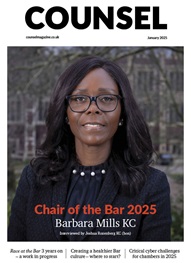*/
Regulation
Chambers and sole practitioners will be “risk-rated” under a Bar Standards Board supervision scheme from January, which will underpin the new Handbook.
Those identified as “high risk” will be supported by the regulator to reduce the likelihood of serious problems occurring.
“Well-run chambers, which set out and comply with clear policies on matters such as complaints handling and pupillage training, will gain a low risk rating and will have little contact with the BSB,” announced the regulator, so that resources are concentrated on “those who need it most”.
Chambers will be assessed against potential risks of ineffective or dishonest governance; poor client service; insufficient consideration of equality and diversity; inadequate or unfair pupillage or training; and incompetent or dishonest financial management.
The new supervision arrangements were introduced following a consultation earlier this year and replace the monitoring system implemented in 2010, in which chambers were contacted to verify compliance in key areas.
Announcing the new scheme, the Bar Standards Board’s Head of Quality, Oliver Hanmer, said: “We all know that prevention is better than cure. This new approach is about smarter regulation for the Bar and better protection for the public. Working with us to prevent potential risks materialising will mean minimising the amount of supervision chambers receive, and a more targeted use of resources on our part.”
Chambers will receive an impact audit survey next spring to identify the impact that any potential breach of the regulatory rules would have on the public and consumers. Most chambers will then have to complete a Supervision Return form – detailing how effectively potential risks are being managed to help the BSB determine the likelihood of them materialising.
Matthew Nicklin QC, Chair of the BSB’s Standards Committee, assured Bar Conference delegates that this would not be a “Big Brother” style of monitoring (see p22).
“Well-run chambers, which set out and comply with clear policies on matters such as complaints handling and pupillage training, will gain a low risk rating and will have little contact with the BSB,” announced the regulator, so that resources are concentrated on “those who need it most”.
Chambers will be assessed against potential risks of ineffective or dishonest governance; poor client service; insufficient consideration of equality and diversity; inadequate or unfair pupillage or training; and incompetent or dishonest financial management.
The new supervision arrangements were introduced following a consultation earlier this year and replace the monitoring system implemented in 2010, in which chambers were contacted to verify compliance in key areas.
Announcing the new scheme, the Bar Standards Board’s Head of Quality, Oliver Hanmer, said: “We all know that prevention is better than cure. This new approach is about smarter regulation for the Bar and better protection for the public. Working with us to prevent potential risks materialising will mean minimising the amount of supervision chambers receive, and a more targeted use of resources on our part.”
Chambers will receive an impact audit survey next spring to identify the impact that any potential breach of the regulatory rules would have on the public and consumers. Most chambers will then have to complete a Supervision Return form – detailing how effectively potential risks are being managed to help the BSB determine the likelihood of them materialising.
Matthew Nicklin QC, Chair of the BSB’s Standards Committee, assured Bar Conference delegates that this would not be a “Big Brother” style of monitoring (see p22).
Regulation
Chambers and sole practitioners will be “risk-rated” under a Bar Standards Board supervision scheme from January, which will underpin the new Handbook.
Those identified as “high risk” will be supported by the regulator to reduce the likelihood of serious problems occurring.


The Bar Council faces both opportunities and challenges on our key areas this year
Rachel Davenport, Co-founder and Director at AlphaBiolabs, discusses the role that drug, alcohol and DNA testing can play in non-court dispute resolution (NCDR)
Casey Randall explores what makes AlphaBiolabs the industry leader for court-admissible DNA testing
By Louise Crush of Westgate Wealth Management
A family lawyer has won a £500 donation for her preferred charity, an education centre for women from disadvantaged backgrounds, thanks to drug, alcohol and DNA testing laboratory AlphaBiolabs’ Giving Back campaign
Louise Crush of Westgate Wealth Management highlights some of the ways you can cut your IHT bill
What's it like being a legal trainee at the Crown Prosecution Service? Amy describes what drew her to the role, the skills required and a typical day in the life
Barbara Mills KC wants to raise the profile of the family Bar. She also wants to improve wellbeing and enhance equality, diversity and inclusion in the profession. She talks to Joshua Rozenberg KC (hon) about her plans for the year ahead
Are Birmingham’s Intensive Supervision Courts successfully turning women offenders’ lives around? Chloe Ashley talks to District Judge Michelle Smith
Professor Dominic Regan and Seán Jones KC identify good value bottles across the price spectrum – from festive fizz to reliable reds
Governments who play fast and loose with the law get into real trouble, says the new Attorney General. The Rt Hon Lord Hermer KC talks to Anthony Inglese CB about what drew this boy from Cardiff to the Bar, bringing the barrister ethos to the front bench, and how he will be measuring success